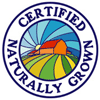What do labels actually tell us about a food's production?
It's valuable to know the subtle differences between common food labels, especially when some labels significantly influence prices. Labels may be backed by government oversight, signify inclusion in independent verification programs, or simply represent marketing ploys. Know what you're purchasing.
 USDA Organic certification indicates: "The food...has been produced through methods that integrate cultural, biological, and mechanical practices that foster cycling of resources, promote ecological balance, and conserve biodiversity. Synthetic fertilizers, sewage sludge, irradiation, and genetic engineering may not be used."
USDA Organic certification indicates: "The food...has been produced through methods that integrate cultural, biological, and mechanical practices that foster cycling of resources, promote ecological balance, and conserve biodiversity. Synthetic fertilizers, sewage sludge, irradiation, and genetic engineering may not be used."(Try Farm Aid's organic knowledge quiz to tests your knowledge of the term "organic".)
USDA Free-range chickens are provided shelter in a building, room, or area with unlimited access to food, fresh water, and continuous access to the outdoors during their production cycle. The outdoor area may or may not be fenced and/or covered with netting-like material. There is no standard for free range beef, pork, or chicken eggs.
Pasture-raised. The USDA has not developed a federal definition for pasture-raised products.
Humane. The USDA does not specifically verify humane treatment of animals. (The American Humane Certified program ensures, "Animals raised for dairy, poultry, beef, veal, goat, swine, turkey and bison products are raised in a humane manner.)
 Animal Welfare Approved. A division of the Animal Welfare Institute certifies family farms when, "Animals are able to behave naturally and be in a state of physical and psychological well-being".
Animal Welfare Approved. A division of the Animal Welfare Institute certifies family farms when, "Animals are able to behave naturally and be in a state of physical and psychological well-being".Understanding the meaning behind food labels ensures that our purchases reflect our personal values.



